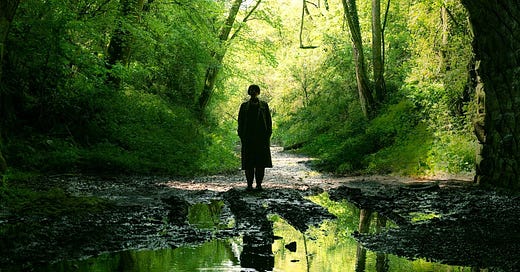Reviews: "Men," "Bergman Island"
Men (Dir. Alex Garland)
It’s been four years since Alex Garland’s previous film, Annihilation, the lavish Netflix sci-fi picture starring Natalie Portman, Oscar Isaac, and Jennifer Jason Leigh. Men, his newly released bucolic horror, is, at least in terms of scale, somewhat lesser. Jessie Buckley plays Harper, a woman seeking solace in the English countryside following the death of her troubled husband. After renting an old manor house, things (expectedly) become a little spooky: Harper finds herself unnerved after being stalked by a feral nudist through the supposedly calming woodland. This nudist is played by Rory Kinnear (perhaps best known to moviegoers for his role as Tanner in the Daniel Craig Bond films), and the wax-jacket-wearing toff landlord is played by Rory Kinnear, as is the local bobby, publican, lascivious priest, and misogynistic pre-teen. Following Buckley’s striking-as-always performance, this is Men’s most impressive element. Kinnear, bedecked with wigs, false teeth, and unnerving CGI, offers an excellent turn as the eponymous men, with each character embodying particular aspects of a dismissive, lustful, and contemptuous patriarchy.
Post-Sarah Everard, Kinnear’s men are alarming, frightening, and embarrassing in equal measure. Thankfully, Buckley’s character is far from the “damsel in distress” that her bumbling landlord perceives her to be. He is, Harper notes, “a very specific type,” and the same can be said of all Kinnear’s characters: they are both individual and universal, reflective of men in our own lives whom we have met and will undoubtedly meet again. There does seem to be a certain pessimism at play, with Garland’s inclusion of the mythic “Green Man” figure suggesting that oppressive misogyny is both eternal and irrevocable. A grotesque series of births and rebirths at the film’s conclusion implicates Harper’s own husband in this perennial cycle of gendered maltreatment. A year after the sentencing of Wayne Couzens and the resultant awareness of institutionalised misogyny, it is challenging, admittedly, to feel optimistic. Yet what does Garland have to say? Men’s ending leaves one with the deflation of a fart with no follow through. Though it offers an image of endurance in Harper’s survival, Men acknowledges the state of things and then… fin.
—Alexander Ferrier
Bergman Island (Dir. Mia Hansen-Løve)
If you’ve ever seen a film by Ingmar Bergman, the Swedish director behind classics as The Seventh Seal (1957) and Persona (1966), then the idea of a couple’s retreat to the island where he spent his childhood summers might not seem like the smartest idea. But don’t take my word for it: when spouses Chris (Vicky Krieps) and Tony (Tim Roth) arrive at their summer rental home on the titular island of Fårö, the owner is quick to inform them that they will be sleeping in bed where Bergman shot Scenes from a Marriage (1973), “the film that made millions of people divorce.” A comforting thought, no doubt.
Yet in Bergman Island, the new film from writer-director Mia Hansen-Løve, an atmosphere of tortured artistry might be just what the doctor ordered. As an artistic couple in search of inspiration, Chris and Tony’s summer sojourn to Fårö quickly turns into a quiet confrontation of their own fractured marriage. That may sound dispiriting in a particularly Bergman-esque way. Thankfully, it isn’t. On Bergman Island, the Swedish master is not so much an immediate presence as a wistful ghost—one who only subtly influences the lives and creative output of the married couple. Hansen-Løve is far less interested in Swedish film history than in the abstracting effects of creativity and the ineffable line it creates between fiction and reality.
The story is delivered in a film-within-a-film format, with Chris and Tony’s work holiday framing another, more exciting story. Chris is in the process of writing a new screenplay, one that tells the story of Amy (Mia Wasikowska), a twentysomething American filmmaker visiting Fårö, and Joseph (Anders Danielsen Lie), an old flame whose arrival quickly resparks their passion. This story—which is frankly far more engaging than Chris and Tony’s passionless marriage—comes alive before our very eyes during one elongated sequence midway through the film, when Chris recounts her screenplay to a half-attentive Tony. We watch Amy and Joseph’s desirous romance in stark contrast to Chris and Tony’s middle-aged boredom, one that arrives at its emotional peak in a fervent, heartfelt scene in which Amy dances to ABBA’s “The Winner Takes It All.”
Unlike her own passionless marriage, the fictional world that Chris creates is filled with lust, emotion, and spectacular romance. Given the state of her marriage, it only makes sense that she would escape into fantasy. This isn’t to say that the two are headed towards catatastrophe, however: theirs is rather a partnership stuck blandly between work and monotony—a conceit that would come across as largely uninteresting without the emotional detail provided by Hansen-Løve’s intimate script and clear-minded direction. The film’s two leads shine as well, particularly Krieps, who brings an affable, spontaneous energy that chafes against Roth’s frigidity. An acutely realized instance of this comes when Chris stands up Tony on a “Bergman Safari” tour for an impulsive beachside exploration with a young cinema student. In another, Chris lounges about in an unbuttoned dress shirt, angling for sex, to which Tony gives a blank smile. In such a moribund reality, Chris seeks life in her screenplay.
One could critique the film for making Amy and Joseph’s fictional relationship more interesting than that of its central couple, but that would be missing the point. The excitement of the screenplay reveals that which is absent in Chris’ own reality, thus capturing the need for storytelling in an unfulfilling reality. Hansen-Løve’s personal life could be at play here: she herself was married to filmmaker Olivier Assayas for many a year; could this film be a personal exhumation of her now-defunct marriage? Of course, speculations here can only go so far, but like Fellini’s 8½ (1963) and Kaufman’s Adaptation (2002)—two meta-cinema masterpieces about filmmaking itself—Bergman Island works brilliantly on its own terms. It conveys the power of artistry through the act of artistry, maintaining a clarity of vision, purpose, and emotion all throughout. —James Fahey





